Law Dissertation: Extradition, Political Offence Exception, Terrorism
VerifiedAdded on 2020/07/22
|26
|9539
|63
Dissertation
AI Summary
This dissertation delves into the multifaceted realm of extradition law, with a particular focus on the political offense exception and its implications within the framework of international cooperation and counter-terrorism efforts. The study commences with a comprehensive introduction, providing a foundational understanding of extradition, political crimes, and the role of counter-terrorism conventions, including the European Convention on Extradition. The research then proceeds to analyze the historical development and application of the political offense exception, including its evolution and the restrictions placed upon it. The dissertation also examines the impact of the European Arrest Warrant and the evolving international landscape in the wake of events such as 9/11. The study explores the interplay between extradition law, political offenses, and the challenges posed by terrorism, offering insights into the complexities of balancing national interests with international obligations. The dissertation concludes with a synthesis of the key findings and a critical assessment of the existing legal framework.
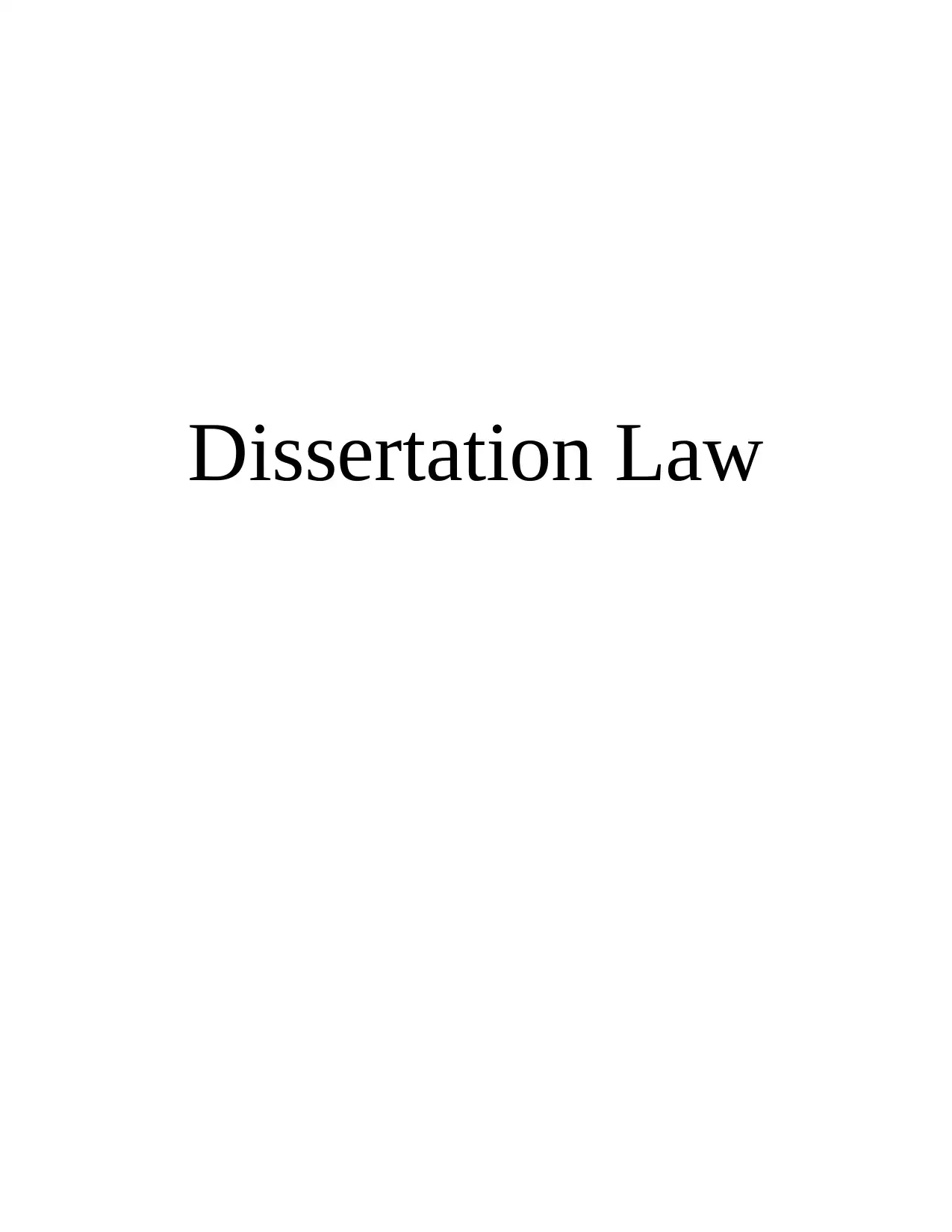
Dissertation Law
Paraphrase This Document
Need a fresh take? Get an instant paraphrase of this document with our AI Paraphraser
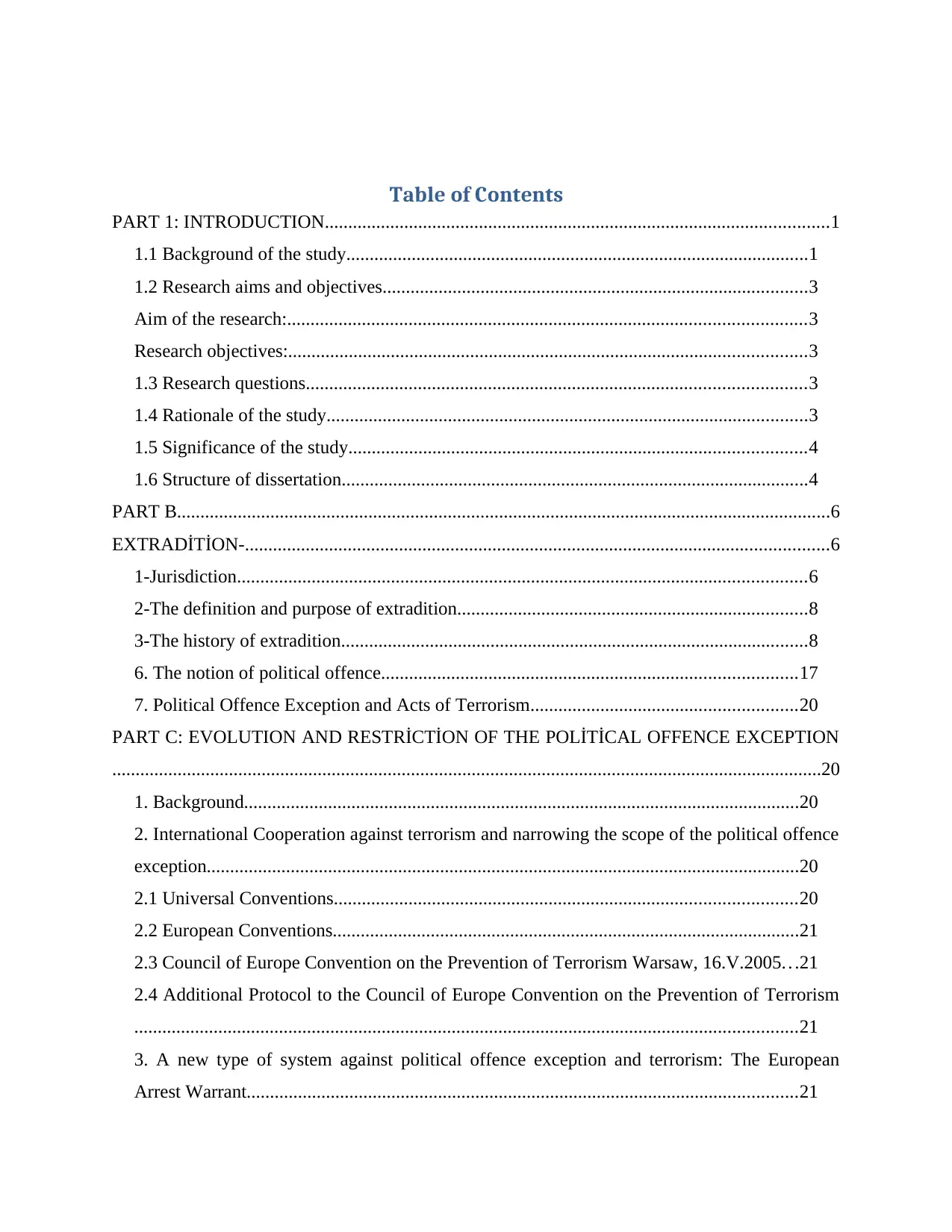
Table of Contents
PART 1: INTRODUCTION............................................................................................................1
1.1 Background of the study...................................................................................................1
1.2 Research aims and objectives...........................................................................................3
Aim of the research:...............................................................................................................3
Research objectives:...............................................................................................................3
1.3 Research questions...........................................................................................................3
1.4 Rationale of the study.......................................................................................................3
1.5 Significance of the study..................................................................................................4
1.6 Structure of dissertation....................................................................................................4
PART B............................................................................................................................................6
EXTRADİTİON-.............................................................................................................................6
1-Jurisdiction..........................................................................................................................6
2-The definition and purpose of extradition...........................................................................8
3-The history of extradition....................................................................................................8
6. The notion of political offence.........................................................................................17
7. Political Offence Exception and Acts of Terrorism.........................................................20
PART C: EVOLUTION AND RESTRİCTİON OF THE POLİTİCAL OFFENCE EXCEPTION
........................................................................................................................................................20
1. Background.......................................................................................................................20
2. International Cooperation against terrorism and narrowing the scope of the political offence
exception...............................................................................................................................20
2.1 Universal Conventions...................................................................................................20
2.2 European Conventions....................................................................................................21
2.3 Council of Europe Convention on the Prevention of Terrorism Warsaw, 16.V.2005.. .21
2.4 Additional Protocol to the Council of Europe Convention on the Prevention of Terrorism
..............................................................................................................................................21
3. A new type of system against political offence exception and terrorism: The European
Arrest Warrant......................................................................................................................21
PART 1: INTRODUCTION............................................................................................................1
1.1 Background of the study...................................................................................................1
1.2 Research aims and objectives...........................................................................................3
Aim of the research:...............................................................................................................3
Research objectives:...............................................................................................................3
1.3 Research questions...........................................................................................................3
1.4 Rationale of the study.......................................................................................................3
1.5 Significance of the study..................................................................................................4
1.6 Structure of dissertation....................................................................................................4
PART B............................................................................................................................................6
EXTRADİTİON-.............................................................................................................................6
1-Jurisdiction..........................................................................................................................6
2-The definition and purpose of extradition...........................................................................8
3-The history of extradition....................................................................................................8
6. The notion of political offence.........................................................................................17
7. Political Offence Exception and Acts of Terrorism.........................................................20
PART C: EVOLUTION AND RESTRİCTİON OF THE POLİTİCAL OFFENCE EXCEPTION
........................................................................................................................................................20
1. Background.......................................................................................................................20
2. International Cooperation against terrorism and narrowing the scope of the political offence
exception...............................................................................................................................20
2.1 Universal Conventions...................................................................................................20
2.2 European Conventions....................................................................................................21
2.3 Council of Europe Convention on the Prevention of Terrorism Warsaw, 16.V.2005.. .21
2.4 Additional Protocol to the Council of Europe Convention on the Prevention of Terrorism
..............................................................................................................................................21
3. A new type of system against political offence exception and terrorism: The European
Arrest Warrant......................................................................................................................21

PART D- CONCLUCİON.............................................................................................................21
REFERENCES..............................................................................................................................22
REFERENCES..............................................................................................................................22
⊘ This is a preview!⊘
Do you want full access?
Subscribe today to unlock all pages.

Trusted by 1+ million students worldwide
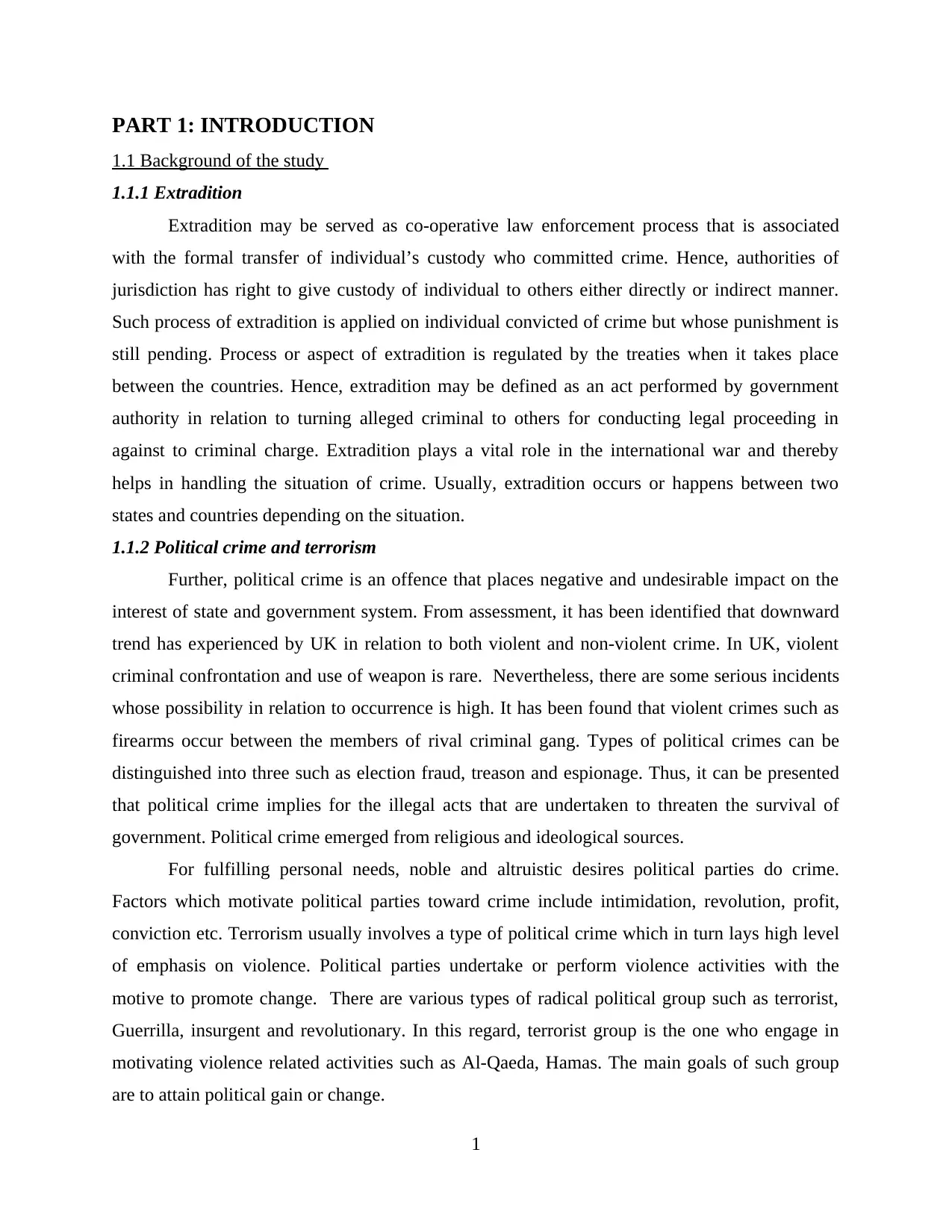
PART 1: INTRODUCTION
1.1 Background of the study
1.1.1 Extradition
Extradition may be served as co-operative law enforcement process that is associated
with the formal transfer of individual’s custody who committed crime. Hence, authorities of
jurisdiction has right to give custody of individual to others either directly or indirect manner.
Such process of extradition is applied on individual convicted of crime but whose punishment is
still pending. Process or aspect of extradition is regulated by the treaties when it takes place
between the countries. Hence, extradition may be defined as an act performed by government
authority in relation to turning alleged criminal to others for conducting legal proceeding in
against to criminal charge. Extradition plays a vital role in the international war and thereby
helps in handling the situation of crime. Usually, extradition occurs or happens between two
states and countries depending on the situation.
1.1.2 Political crime and terrorism
Further, political crime is an offence that places negative and undesirable impact on the
interest of state and government system. From assessment, it has been identified that downward
trend has experienced by UK in relation to both violent and non-violent crime. In UK, violent
criminal confrontation and use of weapon is rare. Nevertheless, there are some serious incidents
whose possibility in relation to occurrence is high. It has been found that violent crimes such as
firearms occur between the members of rival criminal gang. Types of political crimes can be
distinguished into three such as election fraud, treason and espionage. Thus, it can be presented
that political crime implies for the illegal acts that are undertaken to threaten the survival of
government. Political crime emerged from religious and ideological sources.
For fulfilling personal needs, noble and altruistic desires political parties do crime.
Factors which motivate political parties toward crime include intimidation, revolution, profit,
conviction etc. Terrorism usually involves a type of political crime which in turn lays high level
of emphasis on violence. Political parties undertake or perform violence activities with the
motive to promote change. There are various types of radical political group such as terrorist,
Guerrilla, insurgent and revolutionary. In this regard, terrorist group is the one who engage in
motivating violence related activities such as Al-Qaeda, Hamas. The main goals of such group
are to attain political gain or change.
1
1.1 Background of the study
1.1.1 Extradition
Extradition may be served as co-operative law enforcement process that is associated
with the formal transfer of individual’s custody who committed crime. Hence, authorities of
jurisdiction has right to give custody of individual to others either directly or indirect manner.
Such process of extradition is applied on individual convicted of crime but whose punishment is
still pending. Process or aspect of extradition is regulated by the treaties when it takes place
between the countries. Hence, extradition may be defined as an act performed by government
authority in relation to turning alleged criminal to others for conducting legal proceeding in
against to criminal charge. Extradition plays a vital role in the international war and thereby
helps in handling the situation of crime. Usually, extradition occurs or happens between two
states and countries depending on the situation.
1.1.2 Political crime and terrorism
Further, political crime is an offence that places negative and undesirable impact on the
interest of state and government system. From assessment, it has been identified that downward
trend has experienced by UK in relation to both violent and non-violent crime. In UK, violent
criminal confrontation and use of weapon is rare. Nevertheless, there are some serious incidents
whose possibility in relation to occurrence is high. It has been found that violent crimes such as
firearms occur between the members of rival criminal gang. Types of political crimes can be
distinguished into three such as election fraud, treason and espionage. Thus, it can be presented
that political crime implies for the illegal acts that are undertaken to threaten the survival of
government. Political crime emerged from religious and ideological sources.
For fulfilling personal needs, noble and altruistic desires political parties do crime.
Factors which motivate political parties toward crime include intimidation, revolution, profit,
conviction etc. Terrorism usually involves a type of political crime which in turn lays high level
of emphasis on violence. Political parties undertake or perform violence activities with the
motive to promote change. There are various types of radical political group such as terrorist,
Guerrilla, insurgent and revolutionary. In this regard, terrorist group is the one who engage in
motivating violence related activities such as Al-Qaeda, Hamas. The main goals of such group
are to attain political gain or change.
1
Paraphrase This Document
Need a fresh take? Get an instant paraphrase of this document with our AI Paraphraser
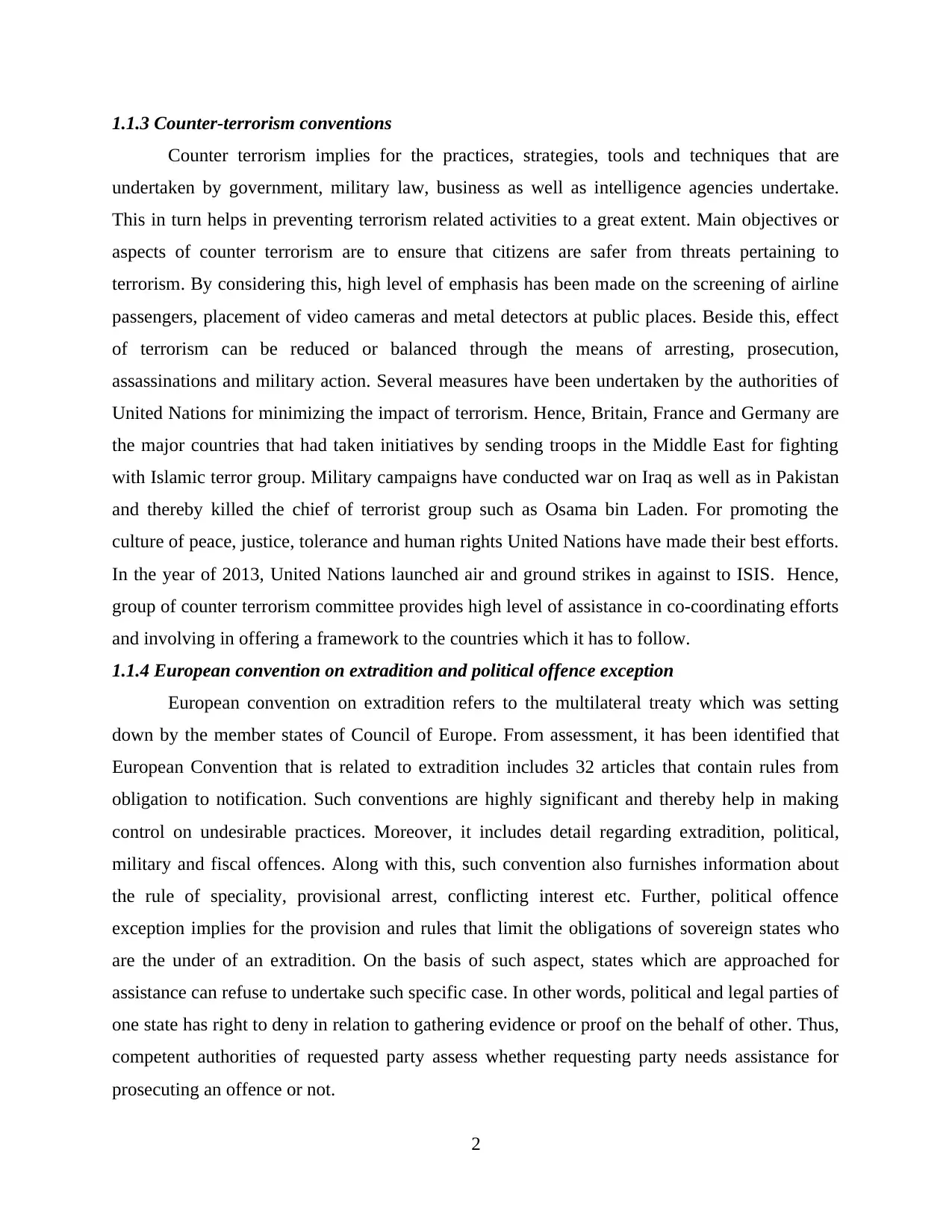
1.1.3 Counter-terrorism conventions
Counter terrorism implies for the practices, strategies, tools and techniques that are
undertaken by government, military law, business as well as intelligence agencies undertake.
This in turn helps in preventing terrorism related activities to a great extent. Main objectives or
aspects of counter terrorism are to ensure that citizens are safer from threats pertaining to
terrorism. By considering this, high level of emphasis has been made on the screening of airline
passengers, placement of video cameras and metal detectors at public places. Beside this, effect
of terrorism can be reduced or balanced through the means of arresting, prosecution,
assassinations and military action. Several measures have been undertaken by the authorities of
United Nations for minimizing the impact of terrorism. Hence, Britain, France and Germany are
the major countries that had taken initiatives by sending troops in the Middle East for fighting
with Islamic terror group. Military campaigns have conducted war on Iraq as well as in Pakistan
and thereby killed the chief of terrorist group such as Osama bin Laden. For promoting the
culture of peace, justice, tolerance and human rights United Nations have made their best efforts.
In the year of 2013, United Nations launched air and ground strikes in against to ISIS. Hence,
group of counter terrorism committee provides high level of assistance in co-coordinating efforts
and involving in offering a framework to the countries which it has to follow.
1.1.4 European convention on extradition and political offence exception
European convention on extradition refers to the multilateral treaty which was setting
down by the member states of Council of Europe. From assessment, it has been identified that
European Convention that is related to extradition includes 32 articles that contain rules from
obligation to notification. Such conventions are highly significant and thereby help in making
control on undesirable practices. Moreover, it includes detail regarding extradition, political,
military and fiscal offences. Along with this, such convention also furnishes information about
the rule of speciality, provisional arrest, conflicting interest etc. Further, political offence
exception implies for the provision and rules that limit the obligations of sovereign states who
are the under of an extradition. On the basis of such aspect, states which are approached for
assistance can refuse to undertake such specific case. In other words, political and legal parties of
one state has right to deny in relation to gathering evidence or proof on the behalf of other. Thus,
competent authorities of requested party assess whether requesting party needs assistance for
prosecuting an offence or not.
2
Counter terrorism implies for the practices, strategies, tools and techniques that are
undertaken by government, military law, business as well as intelligence agencies undertake.
This in turn helps in preventing terrorism related activities to a great extent. Main objectives or
aspects of counter terrorism are to ensure that citizens are safer from threats pertaining to
terrorism. By considering this, high level of emphasis has been made on the screening of airline
passengers, placement of video cameras and metal detectors at public places. Beside this, effect
of terrorism can be reduced or balanced through the means of arresting, prosecution,
assassinations and military action. Several measures have been undertaken by the authorities of
United Nations for minimizing the impact of terrorism. Hence, Britain, France and Germany are
the major countries that had taken initiatives by sending troops in the Middle East for fighting
with Islamic terror group. Military campaigns have conducted war on Iraq as well as in Pakistan
and thereby killed the chief of terrorist group such as Osama bin Laden. For promoting the
culture of peace, justice, tolerance and human rights United Nations have made their best efforts.
In the year of 2013, United Nations launched air and ground strikes in against to ISIS. Hence,
group of counter terrorism committee provides high level of assistance in co-coordinating efforts
and involving in offering a framework to the countries which it has to follow.
1.1.4 European convention on extradition and political offence exception
European convention on extradition refers to the multilateral treaty which was setting
down by the member states of Council of Europe. From assessment, it has been identified that
European Convention that is related to extradition includes 32 articles that contain rules from
obligation to notification. Such conventions are highly significant and thereby help in making
control on undesirable practices. Moreover, it includes detail regarding extradition, political,
military and fiscal offences. Along with this, such convention also furnishes information about
the rule of speciality, provisional arrest, conflicting interest etc. Further, political offence
exception implies for the provision and rules that limit the obligations of sovereign states who
are the under of an extradition. On the basis of such aspect, states which are approached for
assistance can refuse to undertake such specific case. In other words, political and legal parties of
one state has right to deny in relation to gathering evidence or proof on the behalf of other. Thus,
competent authorities of requested party assess whether requesting party needs assistance for
prosecuting an offence or not.
2
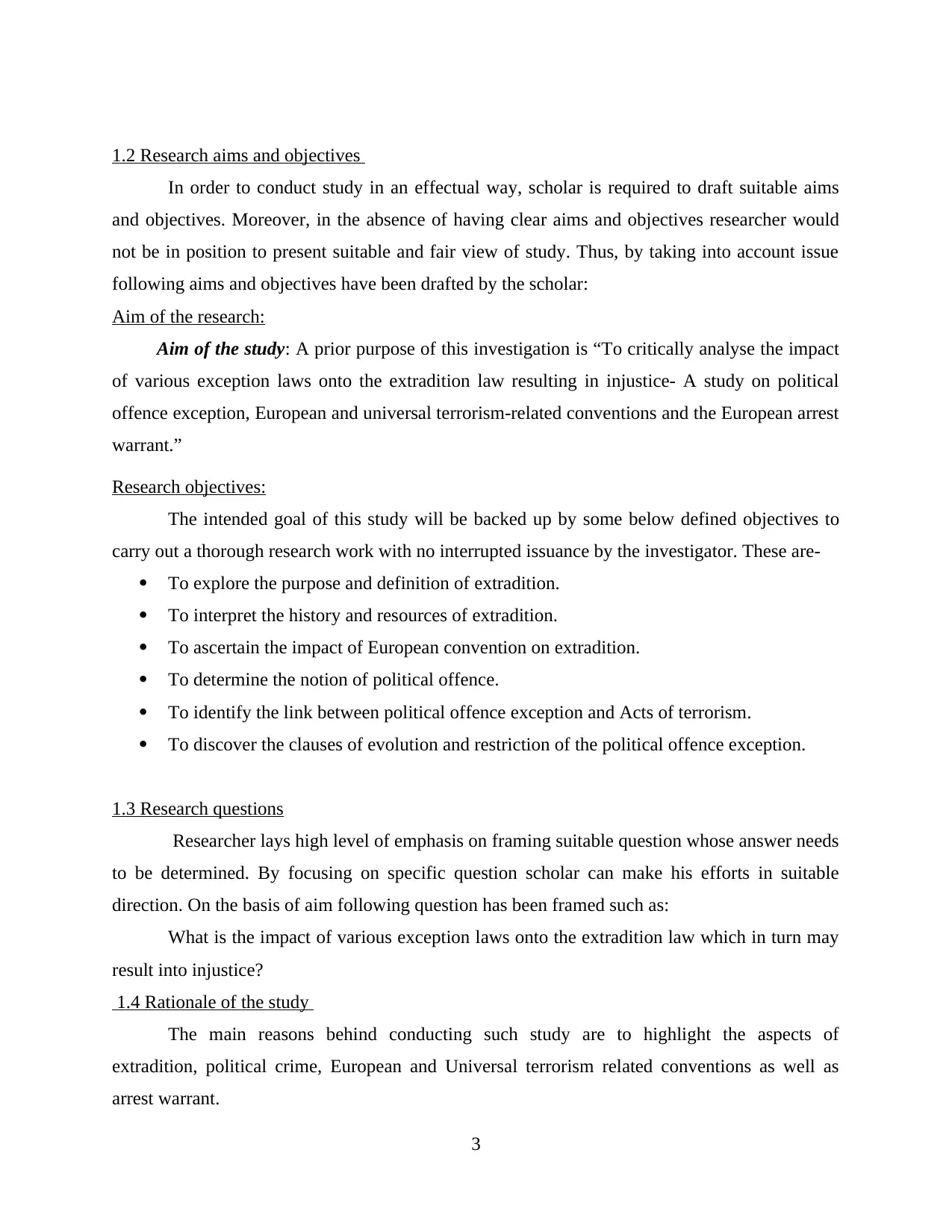
1.2 Research aims and objectives
In order to conduct study in an effectual way, scholar is required to draft suitable aims
and objectives. Moreover, in the absence of having clear aims and objectives researcher would
not be in position to present suitable and fair view of study. Thus, by taking into account issue
following aims and objectives have been drafted by the scholar:
Aim of the research:
Aim of the study: A prior purpose of this investigation is “To critically analyse the impact
of various exception laws onto the extradition law resulting in injustice- A study on political
offence exception, European and universal terrorism-related conventions and the European arrest
warrant.”
Research objectives:
The intended goal of this study will be backed up by some below defined objectives to
carry out a thorough research work with no interrupted issuance by the investigator. These are-
To explore the purpose and definition of extradition.
To interpret the history and resources of extradition.
To ascertain the impact of European convention on extradition.
To determine the notion of political offence.
To identify the link between political offence exception and Acts of terrorism.
To discover the clauses of evolution and restriction of the political offence exception.
1.3 Research questions
Researcher lays high level of emphasis on framing suitable question whose answer needs
to be determined. By focusing on specific question scholar can make his efforts in suitable
direction. On the basis of aim following question has been framed such as:
What is the impact of various exception laws onto the extradition law which in turn may
result into injustice?
1.4 Rationale of the study
The main reasons behind conducting such study are to highlight the aspects of
extradition, political crime, European and Universal terrorism related conventions as well as
arrest warrant.
3
In order to conduct study in an effectual way, scholar is required to draft suitable aims
and objectives. Moreover, in the absence of having clear aims and objectives researcher would
not be in position to present suitable and fair view of study. Thus, by taking into account issue
following aims and objectives have been drafted by the scholar:
Aim of the research:
Aim of the study: A prior purpose of this investigation is “To critically analyse the impact
of various exception laws onto the extradition law resulting in injustice- A study on political
offence exception, European and universal terrorism-related conventions and the European arrest
warrant.”
Research objectives:
The intended goal of this study will be backed up by some below defined objectives to
carry out a thorough research work with no interrupted issuance by the investigator. These are-
To explore the purpose and definition of extradition.
To interpret the history and resources of extradition.
To ascertain the impact of European convention on extradition.
To determine the notion of political offence.
To identify the link between political offence exception and Acts of terrorism.
To discover the clauses of evolution and restriction of the political offence exception.
1.3 Research questions
Researcher lays high level of emphasis on framing suitable question whose answer needs
to be determined. By focusing on specific question scholar can make his efforts in suitable
direction. On the basis of aim following question has been framed such as:
What is the impact of various exception laws onto the extradition law which in turn may
result into injustice?
1.4 Rationale of the study
The main reasons behind conducting such study are to highlight the aspects of
extradition, political crime, European and Universal terrorism related conventions as well as
arrest warrant.
3
⊘ This is a preview!⊘
Do you want full access?
Subscribe today to unlock all pages.

Trusted by 1+ million students worldwide
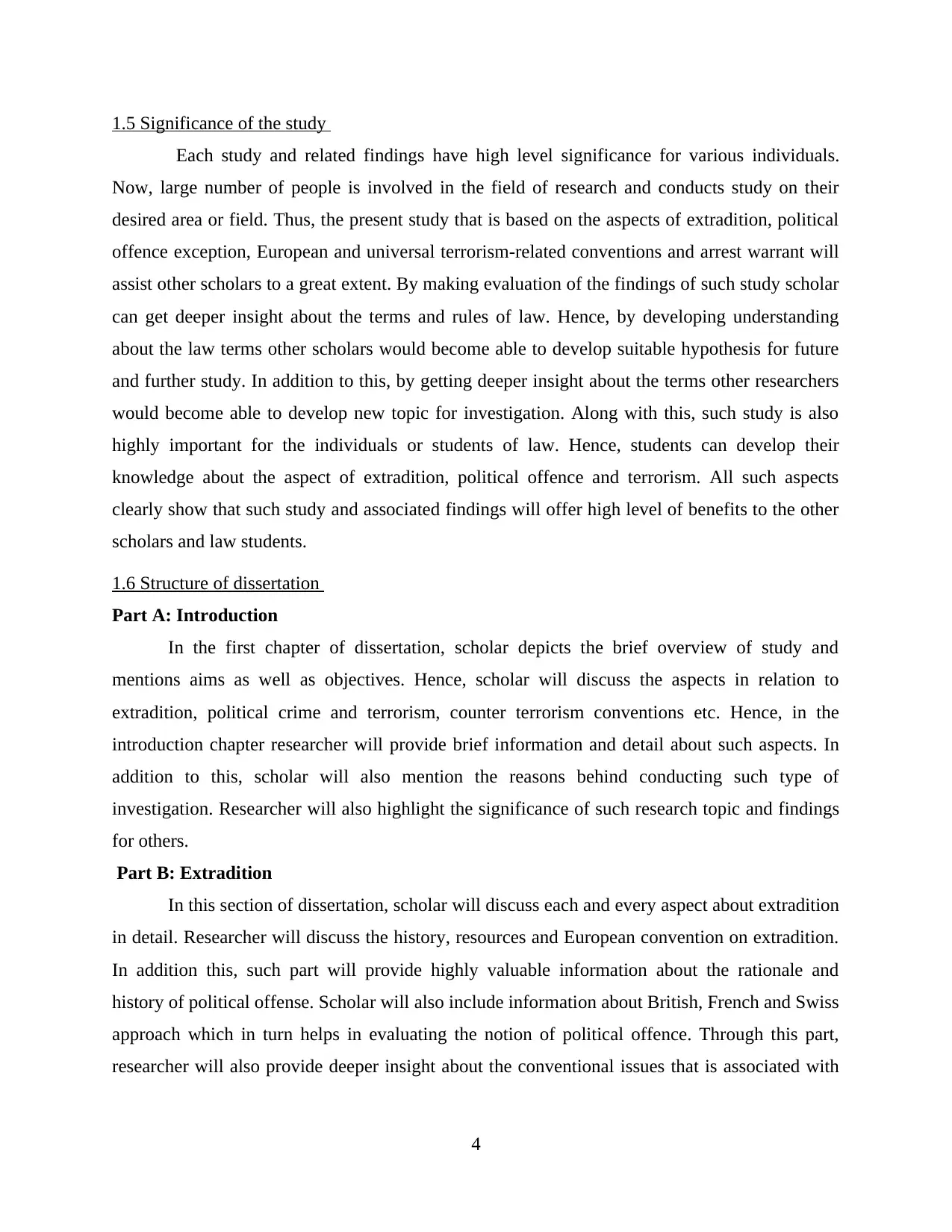
1.5 Significance of the study
Each study and related findings have high level significance for various individuals.
Now, large number of people is involved in the field of research and conducts study on their
desired area or field. Thus, the present study that is based on the aspects of extradition, political
offence exception, European and universal terrorism-related conventions and arrest warrant will
assist other scholars to a great extent. By making evaluation of the findings of such study scholar
can get deeper insight about the terms and rules of law. Hence, by developing understanding
about the law terms other scholars would become able to develop suitable hypothesis for future
and further study. In addition to this, by getting deeper insight about the terms other researchers
would become able to develop new topic for investigation. Along with this, such study is also
highly important for the individuals or students of law. Hence, students can develop their
knowledge about the aspect of extradition, political offence and terrorism. All such aspects
clearly show that such study and associated findings will offer high level of benefits to the other
scholars and law students.
1.6 Structure of dissertation
Part A: Introduction
In the first chapter of dissertation, scholar depicts the brief overview of study and
mentions aims as well as objectives. Hence, scholar will discuss the aspects in relation to
extradition, political crime and terrorism, counter terrorism conventions etc. Hence, in the
introduction chapter researcher will provide brief information and detail about such aspects. In
addition to this, scholar will also mention the reasons behind conducting such type of
investigation. Researcher will also highlight the significance of such research topic and findings
for others.
Part B: Extradition
In this section of dissertation, scholar will discuss each and every aspect about extradition
in detail. Researcher will discuss the history, resources and European convention on extradition.
In addition this, such part will provide highly valuable information about the rationale and
history of political offense. Scholar will also include information about British, French and Swiss
approach which in turn helps in evaluating the notion of political offence. Through this part,
researcher will also provide deeper insight about the conventional issues that is associated with
4
Each study and related findings have high level significance for various individuals.
Now, large number of people is involved in the field of research and conducts study on their
desired area or field. Thus, the present study that is based on the aspects of extradition, political
offence exception, European and universal terrorism-related conventions and arrest warrant will
assist other scholars to a great extent. By making evaluation of the findings of such study scholar
can get deeper insight about the terms and rules of law. Hence, by developing understanding
about the law terms other scholars would become able to develop suitable hypothesis for future
and further study. In addition to this, by getting deeper insight about the terms other researchers
would become able to develop new topic for investigation. Along with this, such study is also
highly important for the individuals or students of law. Hence, students can develop their
knowledge about the aspect of extradition, political offence and terrorism. All such aspects
clearly show that such study and associated findings will offer high level of benefits to the other
scholars and law students.
1.6 Structure of dissertation
Part A: Introduction
In the first chapter of dissertation, scholar depicts the brief overview of study and
mentions aims as well as objectives. Hence, scholar will discuss the aspects in relation to
extradition, political crime and terrorism, counter terrorism conventions etc. Hence, in the
introduction chapter researcher will provide brief information and detail about such aspects. In
addition to this, scholar will also mention the reasons behind conducting such type of
investigation. Researcher will also highlight the significance of such research topic and findings
for others.
Part B: Extradition
In this section of dissertation, scholar will discuss each and every aspect about extradition
in detail. Researcher will discuss the history, resources and European convention on extradition.
In addition this, such part will provide highly valuable information about the rationale and
history of political offense. Scholar will also include information about British, French and Swiss
approach which in turn helps in evaluating the notion of political offence. Through this part,
researcher will also provide deeper insight about the conventional issues that is associated with
4
Paraphrase This Document
Need a fresh take? Get an instant paraphrase of this document with our AI Paraphraser
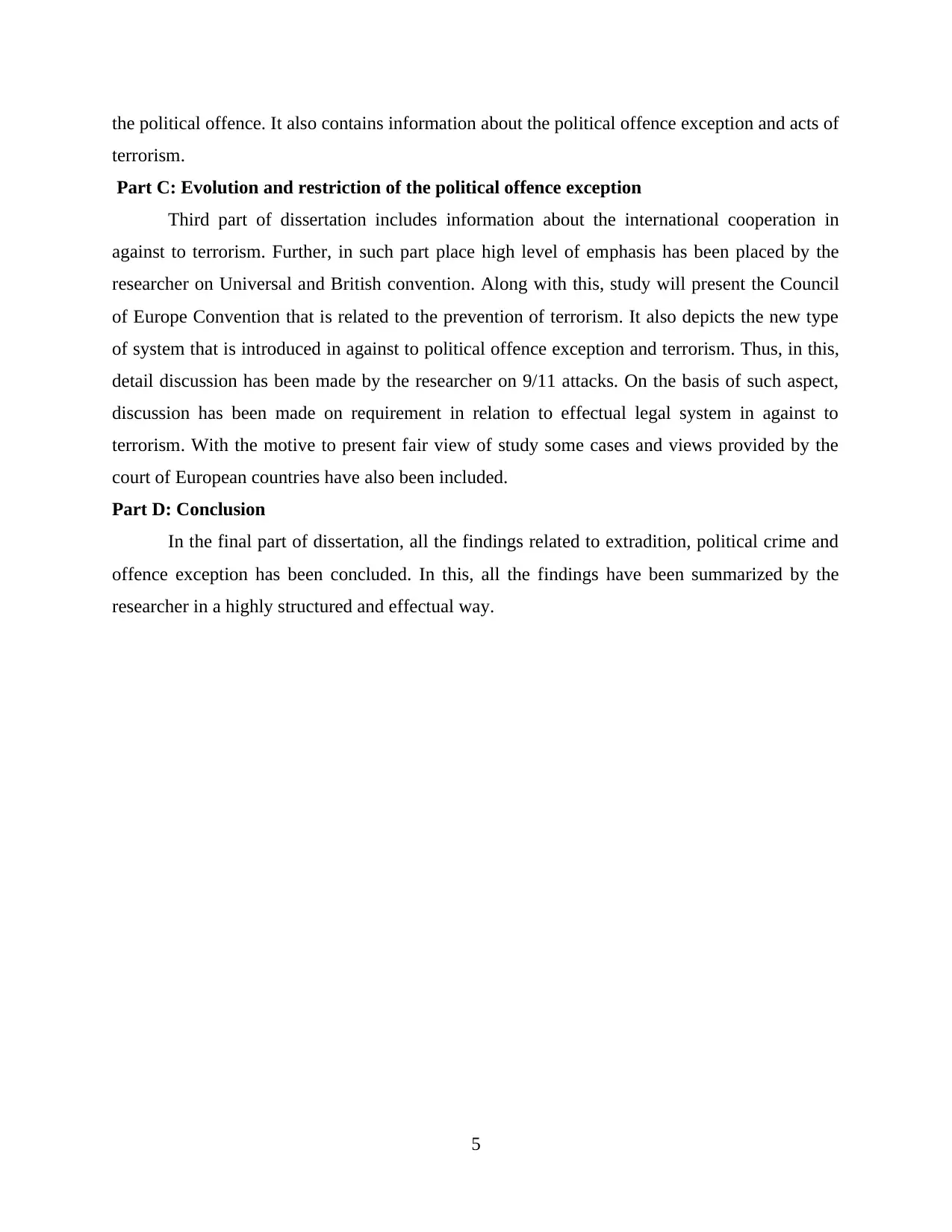
the political offence. It also contains information about the political offence exception and acts of
terrorism.
Part C: Evolution and restriction of the political offence exception
Third part of dissertation includes information about the international cooperation in
against to terrorism. Further, in such part place high level of emphasis has been placed by the
researcher on Universal and British convention. Along with this, study will present the Council
of Europe Convention that is related to the prevention of terrorism. It also depicts the new type
of system that is introduced in against to political offence exception and terrorism. Thus, in this,
detail discussion has been made by the researcher on 9/11 attacks. On the basis of such aspect,
discussion has been made on requirement in relation to effectual legal system in against to
terrorism. With the motive to present fair view of study some cases and views provided by the
court of European countries have also been included.
Part D: Conclusion
In the final part of dissertation, all the findings related to extradition, political crime and
offence exception has been concluded. In this, all the findings have been summarized by the
researcher in a highly structured and effectual way.
5
terrorism.
Part C: Evolution and restriction of the political offence exception
Third part of dissertation includes information about the international cooperation in
against to terrorism. Further, in such part place high level of emphasis has been placed by the
researcher on Universal and British convention. Along with this, study will present the Council
of Europe Convention that is related to the prevention of terrorism. It also depicts the new type
of system that is introduced in against to political offence exception and terrorism. Thus, in this,
detail discussion has been made by the researcher on 9/11 attacks. On the basis of such aspect,
discussion has been made on requirement in relation to effectual legal system in against to
terrorism. With the motive to present fair view of study some cases and views provided by the
court of European countries have also been included.
Part D: Conclusion
In the final part of dissertation, all the findings related to extradition, political crime and
offence exception has been concluded. In this, all the findings have been summarized by the
researcher in a highly structured and effectual way.
5
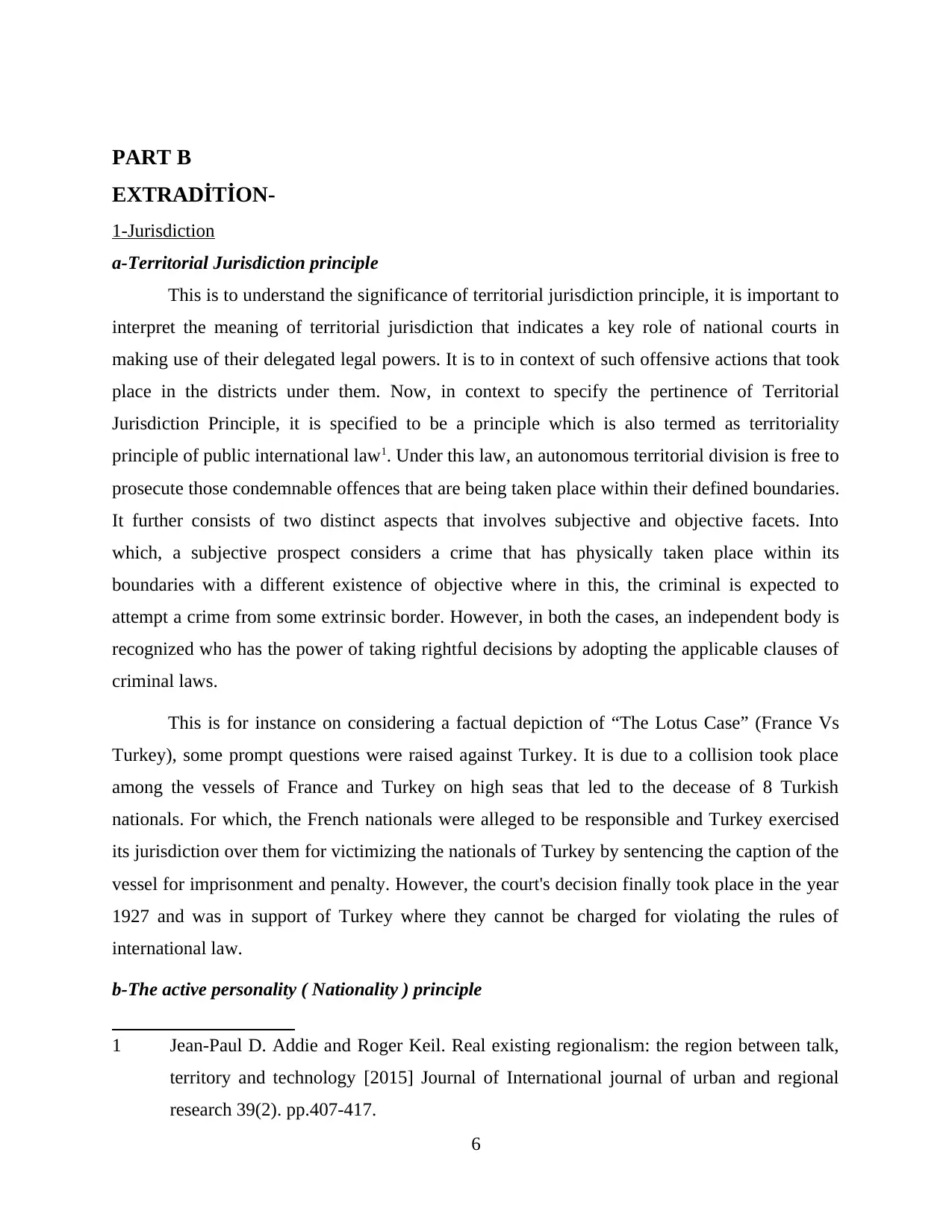
PART B
EXTRADİTİON-
1-Jurisdiction
a-Territorial Jurisdiction principle
This is to understand the significance of territorial jurisdiction principle, it is important to
interpret the meaning of territorial jurisdiction that indicates a key role of national courts in
making use of their delegated legal powers. It is to in context of such offensive actions that took
place in the districts under them. Now, in context to specify the pertinence of Territorial
Jurisdiction Principle, it is specified to be a principle which is also termed as territoriality
principle of public international law1. Under this law, an autonomous territorial division is free to
prosecute those condemnable offences that are being taken place within their defined boundaries.
It further consists of two distinct aspects that involves subjective and objective facets. Into
which, a subjective prospect considers a crime that has physically taken place within its
boundaries with a different existence of objective where in this, the criminal is expected to
attempt a crime from some extrinsic border. However, in both the cases, an independent body is
recognized who has the power of taking rightful decisions by adopting the applicable clauses of
criminal laws.
This is for instance on considering a factual depiction of “The Lotus Case” (France Vs
Turkey), some prompt questions were raised against Turkey. It is due to a collision took place
among the vessels of France and Turkey on high seas that led to the decease of 8 Turkish
nationals. For which, the French nationals were alleged to be responsible and Turkey exercised
its jurisdiction over them for victimizing the nationals of Turkey by sentencing the caption of the
vessel for imprisonment and penalty. However, the court's decision finally took place in the year
1927 and was in support of Turkey where they cannot be charged for violating the rules of
international law.
b-The active personality ( Nationality ) principle
1 Jean-Paul D. Addie and Roger Keil. Real existing regionalism: the region between talk,
territory and technology [2015] Journal of International journal of urban and regional
research 39(2). pp.407-417.
6
EXTRADİTİON-
1-Jurisdiction
a-Territorial Jurisdiction principle
This is to understand the significance of territorial jurisdiction principle, it is important to
interpret the meaning of territorial jurisdiction that indicates a key role of national courts in
making use of their delegated legal powers. It is to in context of such offensive actions that took
place in the districts under them. Now, in context to specify the pertinence of Territorial
Jurisdiction Principle, it is specified to be a principle which is also termed as territoriality
principle of public international law1. Under this law, an autonomous territorial division is free to
prosecute those condemnable offences that are being taken place within their defined boundaries.
It further consists of two distinct aspects that involves subjective and objective facets. Into
which, a subjective prospect considers a crime that has physically taken place within its
boundaries with a different existence of objective where in this, the criminal is expected to
attempt a crime from some extrinsic border. However, in both the cases, an independent body is
recognized who has the power of taking rightful decisions by adopting the applicable clauses of
criminal laws.
This is for instance on considering a factual depiction of “The Lotus Case” (France Vs
Turkey), some prompt questions were raised against Turkey. It is due to a collision took place
among the vessels of France and Turkey on high seas that led to the decease of 8 Turkish
nationals. For which, the French nationals were alleged to be responsible and Turkey exercised
its jurisdiction over them for victimizing the nationals of Turkey by sentencing the caption of the
vessel for imprisonment and penalty. However, the court's decision finally took place in the year
1927 and was in support of Turkey where they cannot be charged for violating the rules of
international law.
b-The active personality ( Nationality ) principle
1 Jean-Paul D. Addie and Roger Keil. Real existing regionalism: the region between talk,
territory and technology [2015] Journal of International journal of urban and regional
research 39(2). pp.407-417.
6
⊘ This is a preview!⊘
Do you want full access?
Subscribe today to unlock all pages.

Trusted by 1+ million students worldwide
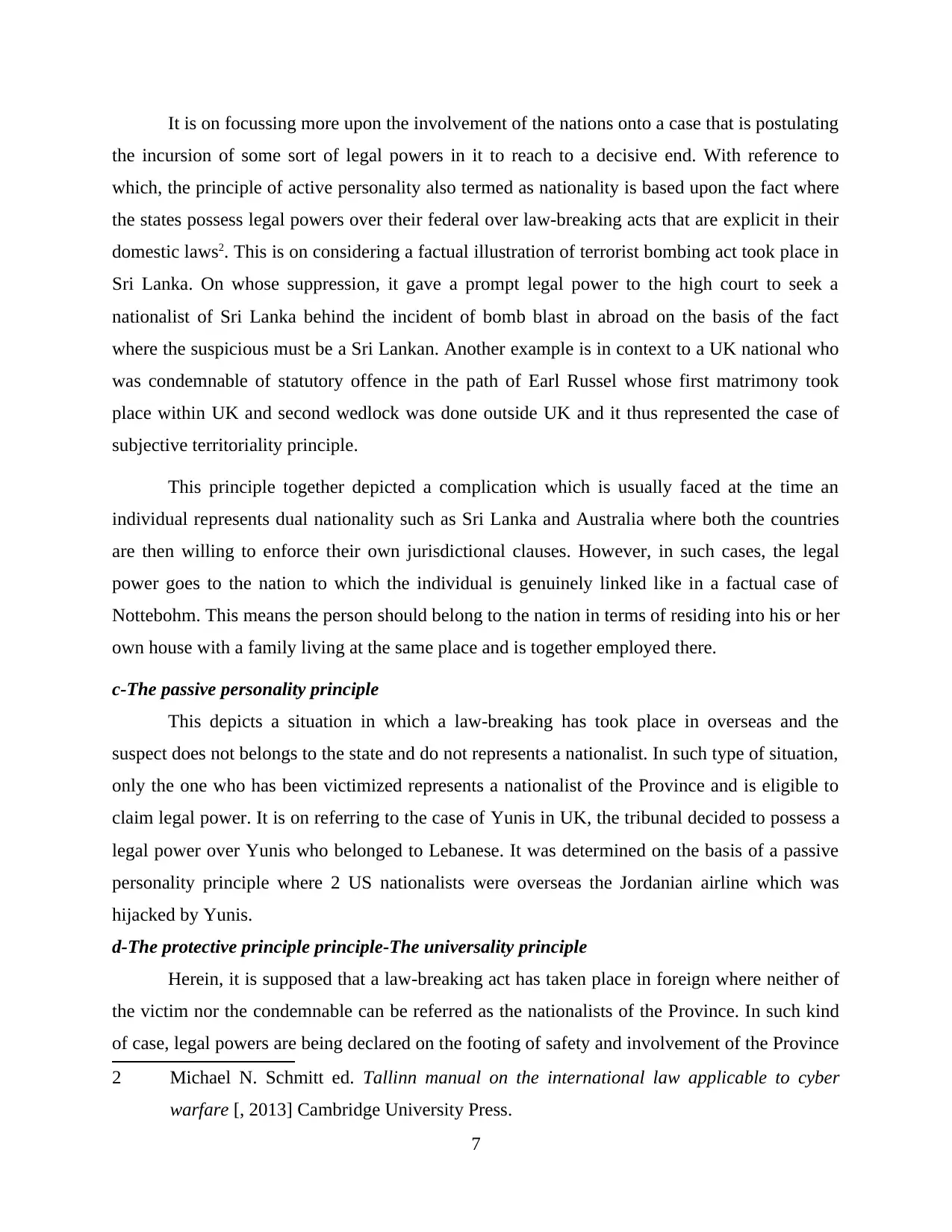
It is on focussing more upon the involvement of the nations onto a case that is postulating
the incursion of some sort of legal powers in it to reach to a decisive end. With reference to
which, the principle of active personality also termed as nationality is based upon the fact where
the states possess legal powers over their federal over law-breaking acts that are explicit in their
domestic laws2. This is on considering a factual illustration of terrorist bombing act took place in
Sri Lanka. On whose suppression, it gave a prompt legal power to the high court to seek a
nationalist of Sri Lanka behind the incident of bomb blast in abroad on the basis of the fact
where the suspicious must be a Sri Lankan. Another example is in context to a UK national who
was condemnable of statutory offence in the path of Earl Russel whose first matrimony took
place within UK and second wedlock was done outside UK and it thus represented the case of
subjective territoriality principle.
This principle together depicted a complication which is usually faced at the time an
individual represents dual nationality such as Sri Lanka and Australia where both the countries
are then willing to enforce their own jurisdictional clauses. However, in such cases, the legal
power goes to the nation to which the individual is genuinely linked like in a factual case of
Nottebohm. This means the person should belong to the nation in terms of residing into his or her
own house with a family living at the same place and is together employed there.
c-The passive personality principle
This depicts a situation in which a law-breaking has took place in overseas and the
suspect does not belongs to the state and do not represents a nationalist. In such type of situation,
only the one who has been victimized represents a nationalist of the Province and is eligible to
claim legal power. It is on referring to the case of Yunis in UK, the tribunal decided to possess a
legal power over Yunis who belonged to Lebanese. It was determined on the basis of a passive
personality principle where 2 US nationalists were overseas the Jordanian airline which was
hijacked by Yunis.
d-The protective principle principle-The universality principle
Herein, it is supposed that a law-breaking act has taken place in foreign where neither of
the victim nor the condemnable can be referred as the nationalists of the Province. In such kind
of case, legal powers are being declared on the footing of safety and involvement of the Province
2 Michael N. Schmitt ed. Tallinn manual on the international law applicable to cyber
warfare [, 2013] Cambridge University Press.
7
the incursion of some sort of legal powers in it to reach to a decisive end. With reference to
which, the principle of active personality also termed as nationality is based upon the fact where
the states possess legal powers over their federal over law-breaking acts that are explicit in their
domestic laws2. This is on considering a factual illustration of terrorist bombing act took place in
Sri Lanka. On whose suppression, it gave a prompt legal power to the high court to seek a
nationalist of Sri Lanka behind the incident of bomb blast in abroad on the basis of the fact
where the suspicious must be a Sri Lankan. Another example is in context to a UK national who
was condemnable of statutory offence in the path of Earl Russel whose first matrimony took
place within UK and second wedlock was done outside UK and it thus represented the case of
subjective territoriality principle.
This principle together depicted a complication which is usually faced at the time an
individual represents dual nationality such as Sri Lanka and Australia where both the countries
are then willing to enforce their own jurisdictional clauses. However, in such cases, the legal
power goes to the nation to which the individual is genuinely linked like in a factual case of
Nottebohm. This means the person should belong to the nation in terms of residing into his or her
own house with a family living at the same place and is together employed there.
c-The passive personality principle
This depicts a situation in which a law-breaking has took place in overseas and the
suspect does not belongs to the state and do not represents a nationalist. In such type of situation,
only the one who has been victimized represents a nationalist of the Province and is eligible to
claim legal power. It is on referring to the case of Yunis in UK, the tribunal decided to possess a
legal power over Yunis who belonged to Lebanese. It was determined on the basis of a passive
personality principle where 2 US nationalists were overseas the Jordanian airline which was
hijacked by Yunis.
d-The protective principle principle-The universality principle
Herein, it is supposed that a law-breaking act has taken place in foreign where neither of
the victim nor the condemnable can be referred as the nationalists of the Province. In such kind
of case, legal powers are being declared on the footing of safety and involvement of the Province
2 Michael N. Schmitt ed. Tallinn manual on the international law applicable to cyber
warfare [, 2013] Cambridge University Press.
7
Paraphrase This Document
Need a fresh take? Get an instant paraphrase of this document with our AI Paraphraser
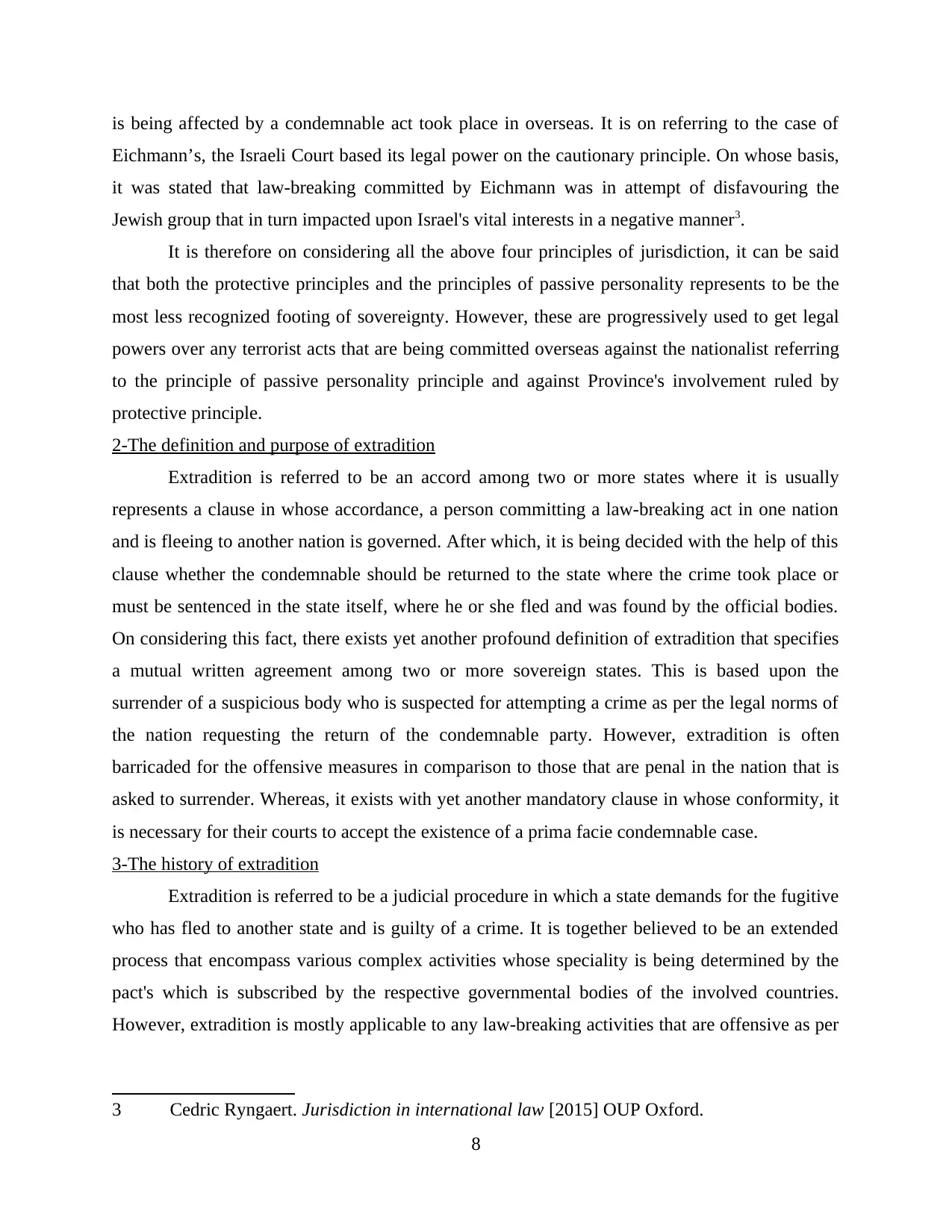
is being affected by a condemnable act took place in overseas. It is on referring to the case of
Eichmann’s, the Israeli Court based its legal power on the cautionary principle. On whose basis,
it was stated that law-breaking committed by Eichmann was in attempt of disfavouring the
Jewish group that in turn impacted upon Israel's vital interests in a negative manner3.
It is therefore on considering all the above four principles of jurisdiction, it can be said
that both the protective principles and the principles of passive personality represents to be the
most less recognized footing of sovereignty. However, these are progressively used to get legal
powers over any terrorist acts that are being committed overseas against the nationalist referring
to the principle of passive personality principle and against Province's involvement ruled by
protective principle.
2-The definition and purpose of extradition
Extradition is referred to be an accord among two or more states where it is usually
represents a clause in whose accordance, a person committing a law-breaking act in one nation
and is fleeing to another nation is governed. After which, it is being decided with the help of this
clause whether the condemnable should be returned to the state where the crime took place or
must be sentenced in the state itself, where he or she fled and was found by the official bodies.
On considering this fact, there exists yet another profound definition of extradition that specifies
a mutual written agreement among two or more sovereign states. This is based upon the
surrender of a suspicious body who is suspected for attempting a crime as per the legal norms of
the nation requesting the return of the condemnable party. However, extradition is often
barricaded for the offensive measures in comparison to those that are penal in the nation that is
asked to surrender. Whereas, it exists with yet another mandatory clause in whose conformity, it
is necessary for their courts to accept the existence of a prima facie condemnable case.
3-The history of extradition
Extradition is referred to be a judicial procedure in which a state demands for the fugitive
who has fled to another state and is guilty of a crime. It is together believed to be an extended
process that encompass various complex activities whose speciality is being determined by the
pact's which is subscribed by the respective governmental bodies of the involved countries.
However, extradition is mostly applicable to any law-breaking activities that are offensive as per
3 Cedric Ryngaert. Jurisdiction in international law [2015] OUP Oxford.
8
Eichmann’s, the Israeli Court based its legal power on the cautionary principle. On whose basis,
it was stated that law-breaking committed by Eichmann was in attempt of disfavouring the
Jewish group that in turn impacted upon Israel's vital interests in a negative manner3.
It is therefore on considering all the above four principles of jurisdiction, it can be said
that both the protective principles and the principles of passive personality represents to be the
most less recognized footing of sovereignty. However, these are progressively used to get legal
powers over any terrorist acts that are being committed overseas against the nationalist referring
to the principle of passive personality principle and against Province's involvement ruled by
protective principle.
2-The definition and purpose of extradition
Extradition is referred to be an accord among two or more states where it is usually
represents a clause in whose accordance, a person committing a law-breaking act in one nation
and is fleeing to another nation is governed. After which, it is being decided with the help of this
clause whether the condemnable should be returned to the state where the crime took place or
must be sentenced in the state itself, where he or she fled and was found by the official bodies.
On considering this fact, there exists yet another profound definition of extradition that specifies
a mutual written agreement among two or more sovereign states. This is based upon the
surrender of a suspicious body who is suspected for attempting a crime as per the legal norms of
the nation requesting the return of the condemnable party. However, extradition is often
barricaded for the offensive measures in comparison to those that are penal in the nation that is
asked to surrender. Whereas, it exists with yet another mandatory clause in whose conformity, it
is necessary for their courts to accept the existence of a prima facie condemnable case.
3-The history of extradition
Extradition is referred to be a judicial procedure in which a state demands for the fugitive
who has fled to another state and is guilty of a crime. It is together believed to be an extended
process that encompass various complex activities whose speciality is being determined by the
pact's which is subscribed by the respective governmental bodies of the involved countries.
However, extradition is mostly applicable to any law-breaking activities that are offensive as per
3 Cedric Ryngaert. Jurisdiction in international law [2015] OUP Oxford.
8
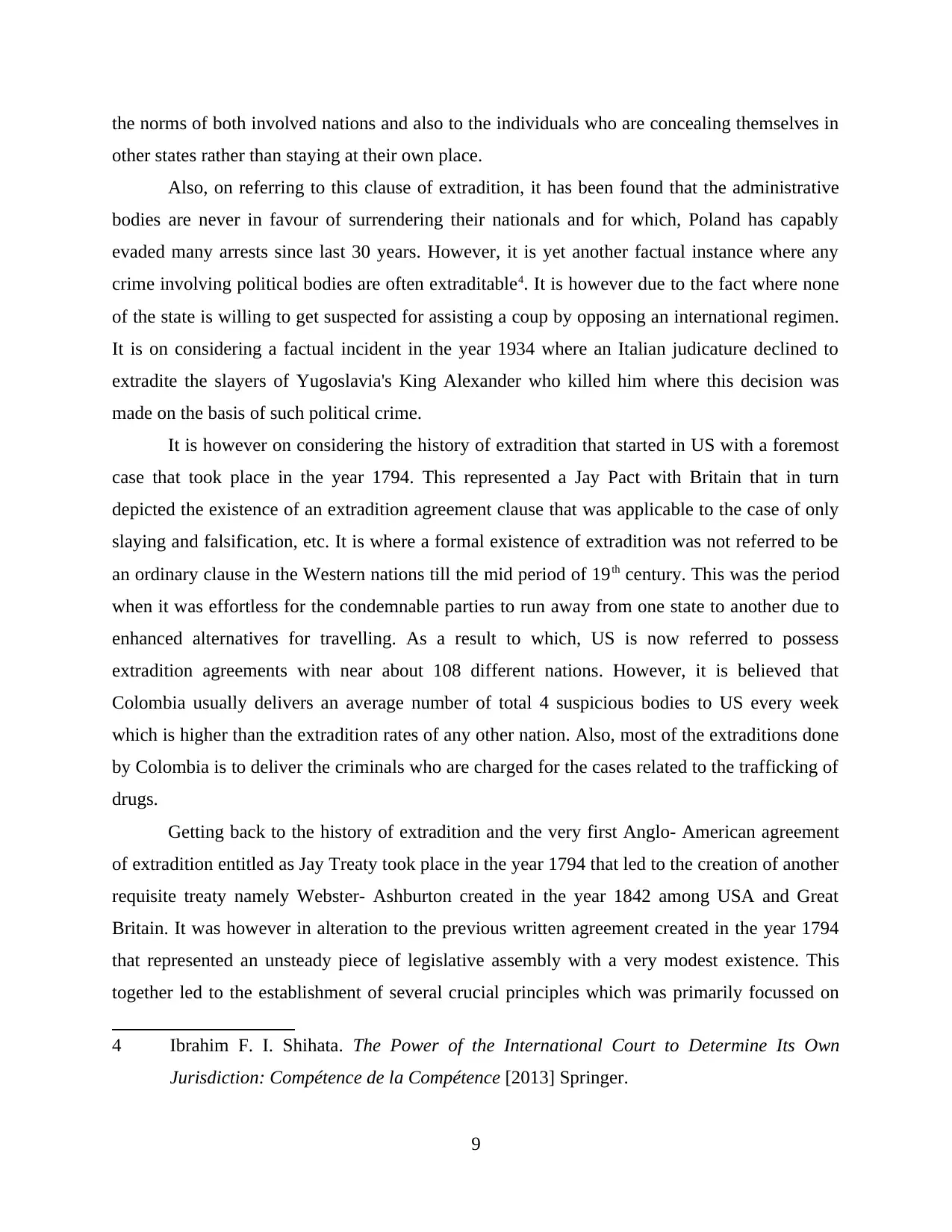
the norms of both involved nations and also to the individuals who are concealing themselves in
other states rather than staying at their own place.
Also, on referring to this clause of extradition, it has been found that the administrative
bodies are never in favour of surrendering their nationals and for which, Poland has capably
evaded many arrests since last 30 years. However, it is yet another factual instance where any
crime involving political bodies are often extraditable4. It is however due to the fact where none
of the state is willing to get suspected for assisting a coup by opposing an international regimen.
It is on considering a factual incident in the year 1934 where an Italian judicature declined to
extradite the slayers of Yugoslavia's King Alexander who killed him where this decision was
made on the basis of such political crime.
It is however on considering the history of extradition that started in US with a foremost
case that took place in the year 1794. This represented a Jay Pact with Britain that in turn
depicted the existence of an extradition agreement clause that was applicable to the case of only
slaying and falsification, etc. It is where a formal existence of extradition was not referred to be
an ordinary clause in the Western nations till the mid period of 19th century. This was the period
when it was effortless for the condemnable parties to run away from one state to another due to
enhanced alternatives for travelling. As a result to which, US is now referred to possess
extradition agreements with near about 108 different nations. However, it is believed that
Colombia usually delivers an average number of total 4 suspicious bodies to US every week
which is higher than the extradition rates of any other nation. Also, most of the extraditions done
by Colombia is to deliver the criminals who are charged for the cases related to the trafficking of
drugs.
Getting back to the history of extradition and the very first Anglo- American agreement
of extradition entitled as Jay Treaty took place in the year 1794 that led to the creation of another
requisite treaty namely Webster- Ashburton created in the year 1842 among USA and Great
Britain. It was however in alteration to the previous written agreement created in the year 1794
that represented an unsteady piece of legislative assembly with a very modest existence. This
together led to the establishment of several crucial principles which was primarily focussed on
4 Ibrahim F. I. Shihata. The Power of the International Court to Determine Its Own
Jurisdiction: Compétence de la Compétence [2013] Springer.
9
other states rather than staying at their own place.
Also, on referring to this clause of extradition, it has been found that the administrative
bodies are never in favour of surrendering their nationals and for which, Poland has capably
evaded many arrests since last 30 years. However, it is yet another factual instance where any
crime involving political bodies are often extraditable4. It is however due to the fact where none
of the state is willing to get suspected for assisting a coup by opposing an international regimen.
It is on considering a factual incident in the year 1934 where an Italian judicature declined to
extradite the slayers of Yugoslavia's King Alexander who killed him where this decision was
made on the basis of such political crime.
It is however on considering the history of extradition that started in US with a foremost
case that took place in the year 1794. This represented a Jay Pact with Britain that in turn
depicted the existence of an extradition agreement clause that was applicable to the case of only
slaying and falsification, etc. It is where a formal existence of extradition was not referred to be
an ordinary clause in the Western nations till the mid period of 19th century. This was the period
when it was effortless for the condemnable parties to run away from one state to another due to
enhanced alternatives for travelling. As a result to which, US is now referred to possess
extradition agreements with near about 108 different nations. However, it is believed that
Colombia usually delivers an average number of total 4 suspicious bodies to US every week
which is higher than the extradition rates of any other nation. Also, most of the extraditions done
by Colombia is to deliver the criminals who are charged for the cases related to the trafficking of
drugs.
Getting back to the history of extradition and the very first Anglo- American agreement
of extradition entitled as Jay Treaty took place in the year 1794 that led to the creation of another
requisite treaty namely Webster- Ashburton created in the year 1842 among USA and Great
Britain. It was however in alteration to the previous written agreement created in the year 1794
that represented an unsteady piece of legislative assembly with a very modest existence. This
together led to the establishment of several crucial principles which was primarily focussed on
4 Ibrahim F. I. Shihata. The Power of the International Court to Determine Its Own
Jurisdiction: Compétence de la Compétence [2013] Springer.
9
⊘ This is a preview!⊘
Do you want full access?
Subscribe today to unlock all pages.

Trusted by 1+ million students worldwide
1 out of 26
Your All-in-One AI-Powered Toolkit for Academic Success.
+13062052269
info@desklib.com
Available 24*7 on WhatsApp / Email
![[object Object]](/_next/static/media/star-bottom.7253800d.svg)
Unlock your academic potential
Copyright © 2020–2026 A2Z Services. All Rights Reserved. Developed and managed by ZUCOL.